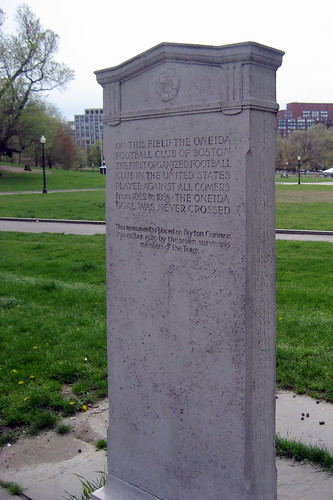John Turnbull has posted an interesting article on the birth of football in the US on The Global Game. The article details the history of Paterson FC, which has a strong claim to being the first club to play football according to the 1863 rules which we honour with our kick-off game in Battersea Park. However, it also mentions Oneida FC of Boston, who were established earlier, but “played one of the football codes–perhaps a soccer-rugby hybrid”. Oneida FC are commemorated with a monument on Boston Common which I think we should visit as we head for Brazil…

The monument (photo wallyg on Flickr, CC license)
Since the idea of The Ball is to some extent inspired by the Olympic Torch and the Torch Relay, we’re following the progress of this year’s torch closely.
2008 Torch Relay on Google Earth  .kml
.kml
If you’re in the UK, this is the route through London tomorrow.
It’s interesting to note that the last time there was a purely overland relay was to the 1980 games in Moscow and indeed how few relays have actually been entirely overland (only three: 1936 Berlin, 1972 Munich and 1980 Moscow). The 2004 games in Athens (the torch relay went global, visiting all the previous hosts of the modern games) seems to have set something of a precedent which has been expanded for this year’s games to a route that seems to be a somewhat aimless promotional tour around the world.
Personally I think this is a pity — and possibly even a mistake — as it seems to detract from the value that the torch has (largely accidentally) accrued as symbolic of the ideals of athletic endeavour. That lofty symbolic quality has been replaced by a return of the torch to its original purpose as something of simply promotional value for the hosts.
UPDATE: Here’s a gallery of photos of the disruptions to the relay
We love the way that the BBC’s Your Game initiative combines music, media, football and opportunity. Check out the video:
This is the first of what will hopefully become a regular feature of this blog — a digest of recent news stories about the 2010 World Cup. So, let’s kick off with a few items that have caught our attention:
South Africans will be able to watch the 2010 Soccer World Cup for free on SABC or at public viewing events, soccer’s governing body Fifa announced on Monday.
The national education department is proposing a five- week long school break during the 2010 Soccer World Cup to avoid pupil and teacher absenteeism and a chaotic transport system, the Daily Dispatch Online reported on Wednesday.
Fifa has been forced to build a £400m contingency fund to cater for the possible collapse of the 2010 World Cup.
Insurers are holding off on a decision to provide coverage for the event in South Africa amid fears that the stadiums will not be ready in time. Assessors for Munich Re, the German insurance giant which insured the 2006 tournament in Germany, are concerned about progress.















